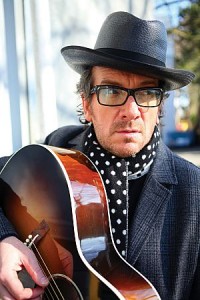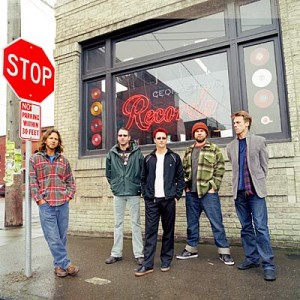 R. Scully’s Rough 7 brought sunshiny good times to Jazz Fest, opening their set at the Acura Stage by singing “I’m Not Insane Anymore” and “Give Up Your Dreams.” Scully also sang one of the most interesting Katrina songs, and one of the few that didn’t sound a little dated. The verse is almost talking blues, recounting his experience sitting on his rooftop with his wife after Katrina, but it never sounds plainspoken because details like swimming through power lines are too surreal. “Learn to hate your real estate,” he concludes from all this. “It could all fall apart.”
R. Scully’s Rough 7 brought sunshiny good times to Jazz Fest, opening their set at the Acura Stage by singing “I’m Not Insane Anymore” and “Give Up Your Dreams.” Scully also sang one of the most interesting Katrina songs, and one of the few that didn’t sound a little dated. The verse is almost talking blues, recounting his experience sitting on his rooftop with his wife after Katrina, but it never sounds plainspoken because details like swimming through power lines are too surreal. “Learn to hate your real estate,” he concludes from all this. “It could all fall apart.”
The least likely and perhaps most powerful version of “I’ll Fly Away” came from Sean Johnson and the Wild Lotus Band. As he droned it as a private dirge in the Lagniappe Stage, his intensity silenced the talkers and sat those who wanted to dance or rhythmically clap, which would have forced a beat on a version that worked just fine without one.
In a city of drummers that swing and syncopate, Derek Miller’s drummer in the Blues Tent put on a clinic in the power of the thump. Nothing he did left me thinking he could count past four, but he never stopped before he got there either.
I caught part of a lyric about a “one night stand” coming from Amanda Shaw. Sounds like she’s growing up all right, but the sentiment would likely be more credible if she had songs about long-term boyfriends first.
Country singer Mark Adam Miller has a few more ex-wife songs than look good on a man, but when he sang “Living Our Life Away” about kicking back on the Redneck Riviera, you could hear how another future ex would fall for him.
Steve Martin, on having his set list on his iPad: “When you have a $500 set list, the act is too big to fail.”
With the Sugarcanes, it became clear that Elvis Costello can rearrange his music for almost any context. Give him a few weeks with Gogol Bordello and he’ll reframe his back catalog as Balkan folk songs. As Costello played string band versions of older songs, Dylan came to mind. Like Dylan, new arrangements opened up dimensions in the songs. “Every Day I Write the Book” went from a lightweight pop tune to something sadder. He added a coda to “Alison” that evoked infidelity when he sang, “Somewhere the king has no wife.” Despite the musical notes of gravity, the show had a pleasantly offhanded feel, as if the band was less a project than a way for Costello to get together with musicians he admired and play some covers he likes. The band included singer Jim Lauderdale and dobro master Jerry Douglas, and covers included “Mystery Train,” “Friend of the Devil,” “Don’t Lie to Me,” “The Race is On” and the Rolling Stones’ “Happy.”
The Creole String Beans have day jobs and don’t appear to have any interest in touring or being national. The freedom that comes with limited ambition is that they can pretty do what they want to do. Play swamp pop? Check. Play New Orleans R&B? Check. Rock up an obscure chestnut (“Alimony” by Frankie Ford)? Check. Cover the Cramps’ “What’s Inside a Girl?” With slight modifications for the swamp pop instrumentation, check.
The Creole String Beans’ cover of the Box Tops’ “Cry Like a Baby” was only the second Alex Chilton I heard at Jazz Fest. Sad.
When MyNameIsJohnMichael played the Best of the Beat, one musician said, “It’s like classic rock, but good.” That was clearer outside on the Gentilly Stage than it was in the House of Blues, where the populist nature of the songs could reach a wide expanse of people. You can point to factors like the number of ascending melodic lines, the dynamic surges, the relentless motion onstage and light undercurrent of melancholy that keeps things from getting too bubbly, but the key is simple. Unlike so many indie rock contemporaries, John Michael Rouchell sings like it matters to him that you hear the words, and his voice is clearly out front. As such, even people who’d never heard the songs before could at least sing along with parts of them, and that’s how songs become hits.
Are beards contagious? Not only did Pepper Keenan have one to rival Anders Osborne’s when he joined him onstage, but Robert Walter was sporting more modest facial hair behind the organ. Stanton Moore seems to be the one person around Osborne to remain hairless. Have we finally discovered something Moore doesn’t do well? Or is he just a relentless shaver?
 After Eddie Vedder raised an ironic toast to BP during Pearl Jam’s set and said, “Send your sons and daughters to clean up your fucking mess,” someone behind me shouted, “Just play music!” Seriously, and I still can’t figure that out. He thought Big Oil was getting a raw deal? That those shrimp have had it too good too long? That the redfish had it coming? That nothing toughens up a wetlands ecosystem like having to deal with adversity?
After Eddie Vedder raised an ironic toast to BP during Pearl Jam’s set and said, “Send your sons and daughters to clean up your fucking mess,” someone behind me shouted, “Just play music!” Seriously, and I still can’t figure that out. He thought Big Oil was getting a raw deal? That those shrimp have had it too good too long? That the redfish had it coming? That nothing toughens up a wetlands ecosystem like having to deal with adversity?
Just as scars remind us of old wounds, Pearl Jam’s “Alive” made me conscious of my Katrina damage. It’s a complicated pathway, but the song’s triumphant assertion of being here took me back to the months after Katrina when America debated whether anyone should live in New Orleans, and whether taxpayer money should be used to help us rebuild. That took me to days in early 2006 when I’d ride my bike to work, a time when much of Magazine Street in the Lower Garden District was closed and Convention Center Boulevard was virtually abandoned because there weren’t any conventions. I’d think about how beautiful everything was, but the emptiness of that ride made recovery feel genuinely in jeopardy. There were days when the first people I’d see in a 15-20-minute stretch would be gutterpunks sleeping on the levee by the Riverwalk. By that point, the news cameras had long since moved on to newer, sexier stories and it felt like a place as remarkable as New Orleans might slip away and no one would notice. That wasn’t the case, and “Alive” isn’t about any of that, but at that moment Saturday, I flashed back to the feeling of having our government and fellow countrymen turn their backs on us, which meant abandoning me in the process. I don’t claim that as a logical progression, but the scar is real, and suspect that all of us will spend the rest of our lives finding more scars and trying to figure out where they came from.
Mildest ovation ever: the one received by Pearl Jam at 6:08 p.m. when it ended its official set. No one could believe they’d left the stage, nor could they believe they wouldn’t come back.
Note to self: Pay more attention to Mia Borders.
How often do we read the narratives we want to see into music? During Sierra Leone’s Refugee All Stars, one person tweeted, “Do I imagine sadness in their eyes?” I wondered if I heard something as intangible as a hard-won wisdom in their voices, but we were both certain of one thing. There was an unmistakable joy in the performance.
Trombone Shorty announced that he played Tipitina’s until 6 a.m. “We got ourselves a little breakfast and we’re at it again,” he said, approximately eight hours after he was last onstage. Those of us who were feeling worn out looked at our feet sheepishly.
“If I wasn’t a gangsta, I’d be crying”—Mystikal, on his reception as a guest artist during Trombone Shorty’s set. Then he led the band into “Shake Ya Ass.”
A friend passed on the Dead Weather because he found Jack White affected, which is like complaining that the sun comes up. Hell yeah, he’s affected. When he took vocal turns during Sunday’s set at Jazz Fest, he hiccuped, gasped and expirated syllables to such a degree that he sometimes sounded more like a DJ scratching than a singer. Alison Mosshart didn’t just seem emotional; every successive line shook her like another trauma or ecstacy. And the band’s affected, taking blues’ tropes and mannerisms to the extreme to perform a similar alchemy to one Led Zeppelin performed years ago.



